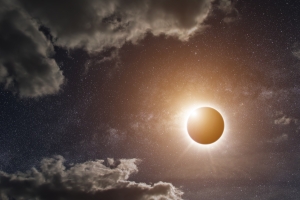Eclipse Season this Fall: What You Need to Know

By Guylaine Vallée, Vedic Palmist-Astrologer
Few astronomical phenomena are as impressive as an eclipse. Eclipses can be very potent symbols of world events and astrologers have always placed great meaning upon them. And in the next few weeks, we will witness a few eclipses.
October 25th: Solar Eclipse
A partial solar eclipse begins Tuesday, October 25th at 4:58 am and ends at 9:02 am EST. The maximum eclipse will be at 7:00 am. Rahu and Ketu are the lunar nodes, which are the points where the moon’s path in the sky crosses the sun’s path, or ecliptic. Solar eclipses occur when the passage of the Moon through a node coincides with the new moon. In this case, the Sun and Moon are in Libra close to the South Node and the North Node is in Aries.
November 8th: Lunar Eclipse
A total lunar eclipse begins Tuesday, November 8th at 3:02 am and ends at 6:59 am, EST. The maximum eclipse will be at 5:59 am. The lunar eclipse occurs with the opposition of the Sun and Moon. In this case, the Sun is in Libra close to the North Node and the Moon (full Moon) in Aries is close to the South Node.
In Vedic astrology, eclipses are regarded as powerful (often tumultuous or even earth-shattering) portents of both personal and world events. The light of the luminaries—the Sun and Moon—is obscured, potentially casting shadows across our awareness. The truth, according to Vedic Astrology, is that the day of an eclipse or the few days surrounding it are not a good time to begin or end things, make important decisions or sign contracts. In fact, the same goes for the 2-week period that separates the solar and lunar eclipses. This is because auspicious beginnings are blessed with light, ideally the light of a healthy, full moon and the daytime sun. We can’t stress it enough, with Rahu and Ketu gobbling up this light, we need to use our discernment wisely.
As the Moon relates to our mind and emotion, during an eclipse, don’t let any unsettling emotions disturb your peace. Ketu, the Moon’s South node, relating to past karma, forces us to take stock of any emotional issues that took place during the last six months. Rahu, the Moon’s North node, relating to the present, can create undue attachments and obsessions. So, this period can be used as a time of reflection to resolve and reset our emotions and move towards the future with a more spiritual understanding of where we have been and where we would like to go.
During these eclipses, it is best to remain peaceful and objective, and not let any emotions overshadow our good judgment. We would be well-served by taking some quiet time to tune in and pay heed to the “small still voice within”—to follow the wisdom of our heart. Make sure, due to the obstruction of the light of the two powerful luminaries that we use our discernment wisely; otherwise, we can affect the happiness of those close to us.
Consequently, it was always considered that during an eclipse, it is a great time to stay in, meditate and be reflective. It is especially effective for introspection and connecting with the Spirit within you.
 And, as eclipses temporarily block the light of the luminaries, it is an ideal time to connect with our inner light through self-reflection, contemplation, mantra and meditation. We recommend reciting the Maha Mrityunjaya Mantra, the mantra of Shiva, during an eclipse. This mantra helps release our consciousness from limiting patterns of negative thought and behavior; it opens us to deeper insight, gives us a greater freedom of self-expression and instills within us the strength needed to meet a specific challenge, attain a desired goal or overcome blockages interfering with our well-being.
And, as eclipses temporarily block the light of the luminaries, it is an ideal time to connect with our inner light through self-reflection, contemplation, mantra and meditation. We recommend reciting the Maha Mrityunjaya Mantra, the mantra of Shiva, during an eclipse. This mantra helps release our consciousness from limiting patterns of negative thought and behavior; it opens us to deeper insight, gives us a greater freedom of self-expression and instills within us the strength needed to meet a specific challenge, attain a desired goal or overcome blockages interfering with our well-being.
To know more about the Maha Mrityunjaya Mantra or to purchase it, click here.



Leave a Reply
Want to join the discussion?Feel free to contribute!